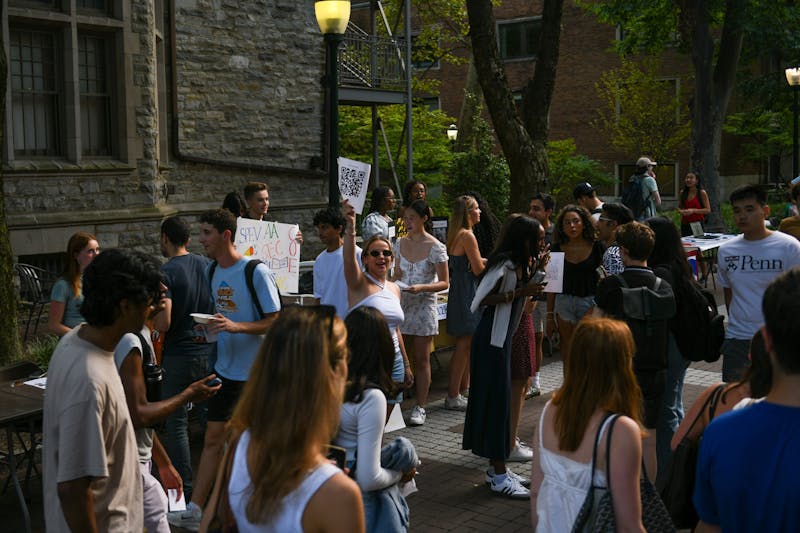
On Oct. 29, Yassir Arafat, the chairman of the Palestinian Authority, was flown to France to receive treatment for a mysterious stomach ailment. In Paris, his health quickly deteriorated, and reports have circulated that he is dying or dead.
As a person who has long been interested in the Middle East conflict, initially I was unsure what to think. What is the right reaction to the reports? Upon further thought, I suggest that the appropriate response is tentative hope.
I admit that reports on Arafat's condition are conflicting. Arafat is variously described as being in an irreversible coma, in a reversible coma and in no coma at all. Some sources claim that Arafat is clinically dead but attached to life support machines on the insistence of his wife, Suha. It's hard to know where the truth lies. However, since Palestinian leaders have every motivation to claim that Arafat is as alive as possible, I think it's safe to assume that Arafat's health is about twice as bad as they claim. I believe Arafat is either clinically dead or close to it.
Yassir Arafat has long been a complex figure. For many Palestinians, he is the first and only person who could unite a dispersed group of people, give them a name and become an icon of their aspirations for self-sovereignty. But others claim that behind the icon lies an ineffective leader who sometimes exploits Palestinian suffering for his own gain.
In reality, Arafat's regime has always been brutal to both Israelis and Palestinians. For Israelis, Arafat is the leader of the most recent Intifada, or uprising, that has caused hundreds of Israeli deaths. Arafat has advocated terrorism that targets Israeli civilians and children, even sponsoring the slaughter of the Israeli athletic team at the 1972 Olympic Games. Arafat's terrorism, combined with his rejection of peace negotiations, has made him one of Israel's most reviled figures.
Sadly, Arafat's rule has been no kinder to his own people. Arafat has cultivated a state of near-anarchy in the West Bank, and the area is largely lawless and controlled by criminal gangs. Some experts have estimated that 15 to 20 percent of Palestinian casualties have been killed by other Palestinians, typically in street violence or on flimsy suspicion of being Israeli "collaborators," according to www.newsmax.com.
Arafat is similarly unable to control warring factions within his own government, primarily due to his refusal to share power. In response to intense international pressure in 2003, Arafat has appointed two successive prime ministers, both of whom quickly resigned in frustration, according to CNN. Moreover, although international organizations have donated billions of dollars to Palestinians in "relief aid," much of it has been stolen by Arafat and stashed in secret Swiss bank accounts, according to the World Tribune.
In this context, what can we expect after Arafat's death? Some analysts have predicted anarchic turmoil. In my view, although there might initially be confusion, long-term prospects are hopeful. A change of leadership could provide the first real boost to the peace process in a long time.
Already, there are positive signs. During Arafat's absence, Palestinian leaders have announced new anti-crime initiatives intended to restore order to the West Bank and Gaza. Although similar measures were discussed months ago, under Arafat, they never materialized. Even more promising, Palestinian leaders recently secured agreements with terror groups to halt attacks against Israeli civilians during the current leadership crisis, in part to ensure that Israeli troops would have no reason to enter Palestinian areas, according to The New York Times. Considering that Mahmoud Abbas and Ahmed Qorei, the top contenders for post-Arafat leadership, have denounced suicide bombings, encouraged the peace process and advocated democratic reforms, these developments are encouraging.
For this progress to continue, a few important things must happen. First, there has been dispute over where Arafat should be buried, with Israelis claiming he should be interred at his family's Gaza plot, and Palestinians claiming that he should be buried at a hotly contested Jewish and Muslim holy site in Jerusalem. On a pragmatic level, it is imperative that Arafat not be buried in Jerusalem. Arafat's burial location will likely become a pilgrimage site, and a steady stream of Muslim pilgrims into a vigorously contested, Israeli-controlled area would exacerbate tensions to the point of crisis. Arafat's preference for a Jerusalem burial is not worth the deaths of 500 more Palestinians and Israelis.
Second, other nations should help foster stability in a post-Arafat West Bank and Gaza by offering training to the new police forces and helping supervise fair elections. Restoring order and electing non-corrupt leaders would reduce Palestinian suffering and limit militants' ability to blame Israel for internal troubles. This would hopefully reduce terrorism and limit Israeli restrictions and military raids in Palestinian areas. Uninterrupted by bouts of violence, the Israeli-Palestinian peace negotiations might finally progress.
I believe that Arafat's death presents a potential turning point in the futures of Israelis, Palestinians and the peace process. Pursued carefully, it may become catalyst for change in a conflict that desperately needs it.
Jennifer Weiss is a senior Linguistics and Theatre Arts major from Los Angeles. War On Error appears on Wednesdays.
The Daily Pennsylvanian is an independent, student-run newspaper. Please consider making a donation to support the coverage that shapes the University. Your generosity ensures a future of strong journalism at Penn.
DonatePlease note All comments are eligible for publication in The Daily Pennsylvanian.







